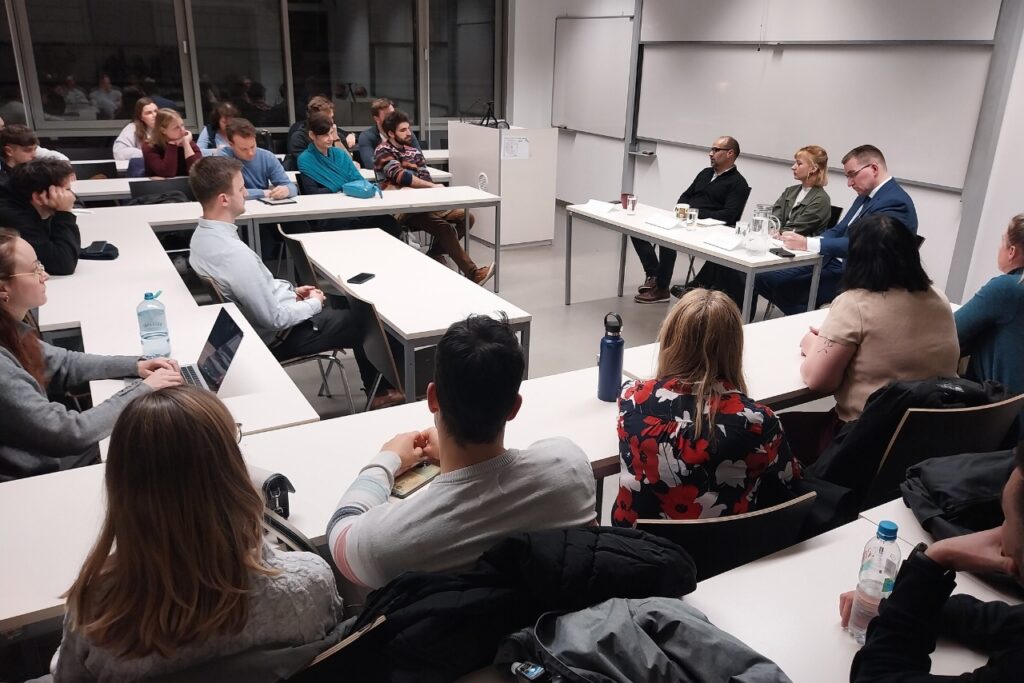IR TALKS 3: Towards three years of war – the Ukrainian and Russian societies
16 December 2024 | Corvinus University of Budapest | C.102

During the third session of the IR TALKS series we discussed, how the full-scale war that has been going on already for nearly three years affected the Ukrainian and Russian societies. The two invited panelists were Ms. Eszter Borissza, a sociologist from the Eötvös Loránd University, specialized on researching the Russian society and Mr. Balázs Jarábik, a political analyst, diplomat, international development executive and Eastern Europe expert. The discussion was moderated by senior lecturer Dr. András Rácz.
The discussion started with the overall assessment of the war. Concerning Ukraine, it was explained that in Ukraine nowadays more and more people are talking about the need to start negotiations in order to end the war somehow – but decisive majority of the society is firmly opposed to any compromise along the terms of Russia. Hence, while there is a growing willingness to seek a negotiated solution, what exactly the necessary compromise could be is far from clear. Meanwhile, war fatigue is clearly measurable by public opinion polls, which is not at all surprising after nearly three years of a full-scale war. Still, no breaking point is visible. Society is still strongly resilient to the hardships of the war, though the initial optimism of 2022 is long gone.
Western support and the perspective of Euro-Atlantic plays a key role in maintaining the resilience of the Ukrainian society. Should the West openly declare that doors of EU and NATO membership are closed for Ukraine, this would be a major blow to the overall resilience of the society, as more and more people would ask, what actually the fighting is for.
Regarding the military situation, when one conducts interviews with policy-makers and experts in Kyiv, the possibility of a partial collapse of the frontline in the East is mentioned increasingly often due to the prevailing military difficulties. This was not the case even a year ago. The high rate of desertion – estimates vary between 100.000-200.000 thousand – , combined with prevailing mobilization hardships is an indicative sign of how deep problems are. However, while Ukraine is indeed losing ground in the southern part of the Donbas, it will take at least months for the Russians to occupy the city of Pokrovsk, a key administrative and logistical hub of the region.
Meanwhile, in Russia, the dominant attitude of the society is exhaustion and resentment. Majority of the people are politically passive, and this is particularly true regarding the war: even if one is sad or depressed about the war, one cannot do much about it. While most Russians would prefer the war to end, for them the defeat of Russia is inconceivable, but no strategic Russian victory is in sight either. When asked about whether they would prefer to continue fighting or seek a negotiated solution, the majority would be already in favor of negotiations – but they know well that their preferences hardly influence the Kremlin.
Self-censorship, combined with state propaganda, a decade of indoctrination and harsh repressive measures make even an informed debate practically impossible. The social discussion is very limited, spaces of any social discourse about the war are closed.
Meanwhile, state propaganda in Russia already started to prepare the population for victory, which is clearly pictured as completely capturing of all four Ukrainian regions that Russia illegally annexed in autumn 2022, thus Luhansk, Donetsk, Zaporizhzhia and Kherson. However, militarily de facto this is close to impossible. Crossing the River Dnipro to re-capture Kherson is way beyond the actual possibilities of the Russian army, and particularly is to take the large, fortified city of Zaporizhzhia, which they have never even reached.
Hence, regarding the possibilities of the conflict settlement, both speakers agreed that no quick solution is in sight. Forging any territorial compromise would be extremely hard, as the belonging of the occupied Ukrainian territories constitute a zero-sum game ever since Russia has illegally annexed them in autumn 2022. Besides, while on the Russian side the conflict is perceived as a war against the entire West, in Ukraine the public perception is that this war is a civilization choice between East and West – this, in the context of the post-Maidan Ukraine makes it extremely unlikely that the Ukrainian society or the elites would agree to any form of again subordinating the country to Russia. This has been the case ever since the 2013-2014 EuroMaidan revolution, and the full-scale invasion only hardened the positions.
Speakers agreed that unless some unexpected, large-scale changes happen, including a possible “Black Swan” scenario, no quick ending of the war is in sight.
IR TALKS is a series of guest and roundtable talks organised by the Department of International Relations at Corvinus University to make sense of the world we live in at a time of turbulent international politics.